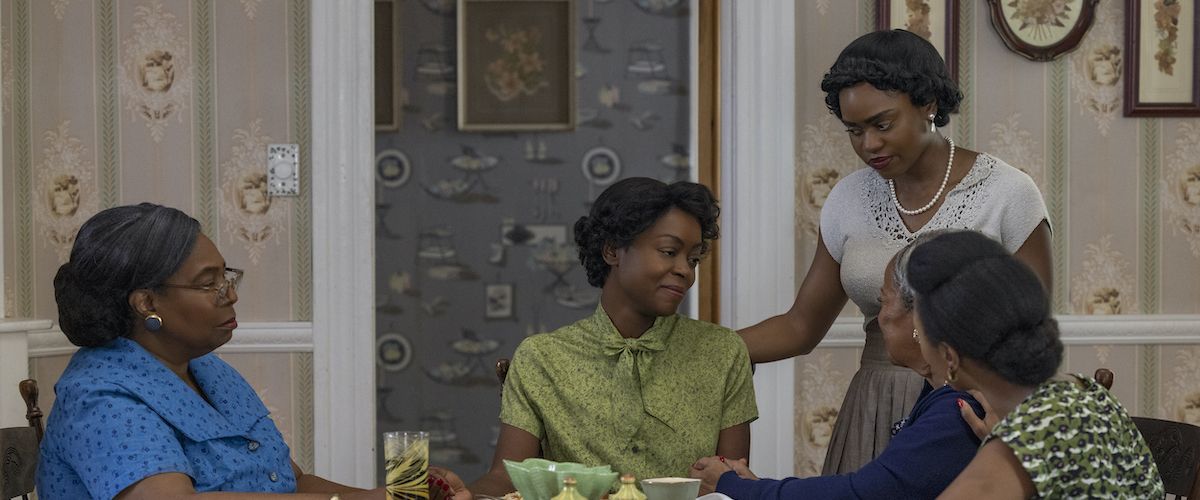By Jonah Naplan
November 5, 2022

CRITIC'S PICK
Till
Review: In 'Till,' the most disturbing movie of the year, Danielle Deadwyler gives a striking performance that shakes you to the core.

By Jonah Naplan
November 5, 2022

“Till” is, without a doubt, the hardest movie I’ve had to watch this year. But that ultimately speaks to the film’s quiet strength and the power of the true story behind it. If you’re unfamiliar with what “Till” is about, the film tells the story of the lynching and eventual murder of 14-year-old Emmett Till in 1955 Mississippi. Actually no. “Till” is only briefly about the lynching itself, and more about the aftermath of it and Mamie Till’s quest for justice in a state that would never even think to offer such a thing.
In the film’s opening scenes, we see Emmett Till preparing to travel south from Chicago to visit his cousins in Money, Mississippi. He goes into a department store to buy a wallet, puts on a suit and his late father’s ring, and kisses his mother goodbye before he hops onto a train. Knowing the movie’s eventual outcome—that happens sooner than you’d expect—watching the first fifteen minutes of “Till” is both heartbreaking and dreadful.
What makes the film even more effective and therefore even more horrendous to think about is the fact that Emmett Till is probably the most likable character I’ve seen in any movie recently. He’s the kind of kid that every parent wishes they had—a charming, innocent but not naive, and curious child whose aura should probably be credited to Jalyn Hall, the young actor portraying him. Emmett, or Beau as his mother calls him, has become symbolic in the world of colored activism and acts of biased hatred. And yet. Joe Biden only signed the Emmett Till Antilynching Act into circulation this past March. Talking about how unprogressive the world may seem is an entirely different conversation for another time. But “Till” cares about every aspect of it, and shows it through the eyes of a mother who always followed the philosophy of “I won’t care until it happens to me.” And then it does.
There are any number of disturbing scenes inside of “Till,” but they wouldn’t be as effective without the powerful performance from Danielle Deadwyler. She plays Mamie Till-Mobley with no restraint, and never keeps us at an arms length away. We always feel her presence, much the same way she can feel that the seemingly unidentifiable corpse of Emmett Till is still her son. The character of Mamie seems to undeniably mirror the ultimate goal of the movie which is not holding back on anything. In the scene that most stood out to me, the film does not censor any part of Emmett Till’s brutally mutilated body at his open-casket funeral. When Mamie first sees Emmett’s corpse, the camera is lenient not to show any of his wounds, obscuring all of him from view. But then the camera rises, and we see his whole body. His arms and legs are bruised and scratched up. His face is so swollen and bloody from the bullet wound that it doesn’t look like a face anymore. This is the first of three consecutive times that the movie doesn’t fail to show the wreckage that the lynching performed. It makes you squirm.
And the most outright upsetting thing about “Till” is also the most agitating part about the true story. This forceful act of extreme belligerence has never been justified and Carolyn Bryant, the white woman of whom Emmett “offended,” has still never been prosecuted. “Till” doesn’t hold your hand through any of this sad story. It doesn’t provide a hopeful ending, let alone a happy one. It tells the truth, and nothing but the truth. And the truth is, the Emmett Till lynching remains unresolved with no punishments issued. Usually I wouldn’t want to get into the politics behind a movie, but “Till” is a different scenario because of how much it cares about that particular variable. It wants to prove with brutal honesty the terrifying reality of what being a Black kid in the South in the 50s was like.
And regardless of whether or not you are a parent of Black children, anyone can effortlessly identify with the film’s message. Nigerian director Chinonye Chukwu crafts a narrative so apparent for our times that its small flaws can be easily overlooked. It’s an angry roar of a movie that isn’t afraid to pull punches. Much of the film’s draw can be easily credited to Deadwyler, who plays a mother just familiar enough to sympathize with, but is still a character caught up in the kind of story that we’re very blessed to not see in the news anymore. For some, the story that “Till” covers is unrecognizable territory. Many movies about racism and/or injustice have an inspiring streak that makes the viewer feel good at the end. With this film, that’s not the case. Walking out of “Till,” you feel bitter and angry. And that’s exactly how we know “Till” did its job in being effective.
From one scene to the next, we see Mamie try to stand her ground against a public that will always try to beat her back down to the gravel. In one infuriating moment, we watch Carolyn Bryant tell her entirely fabricated side of the story during Emmett Till’s court trial. She claims that when she asked for Emmett’s money to pay for his candy in her general store, the young man grabbed her hand tightly and refused to let go. Then he strolled behind the counter, held his hands behind Carolyn’s back and attempted to rape her. The haunting score by Abel Korzeniowski and the editing by Ron Patane help make these moments feel more real.
“Till” is a horror movie, although it belongs to a different subgenre than “Prey for the Devil” and “Nope.” It deals with real life horror. Things that are equally as scary as the creepiest demons and that weird sound coming from the basement. It’s based around things that could actually happen, and further, things that actually did. But it’s the absolute scariest for parents. And really for anyone else who understands what real injustice truly is.
Now playing in theaters.
"Till" is rated PG-13 for thematic content involving racism, strong disturbing images and racial slurs. It's 130 minutes.
JONAHtheCRITIC.com